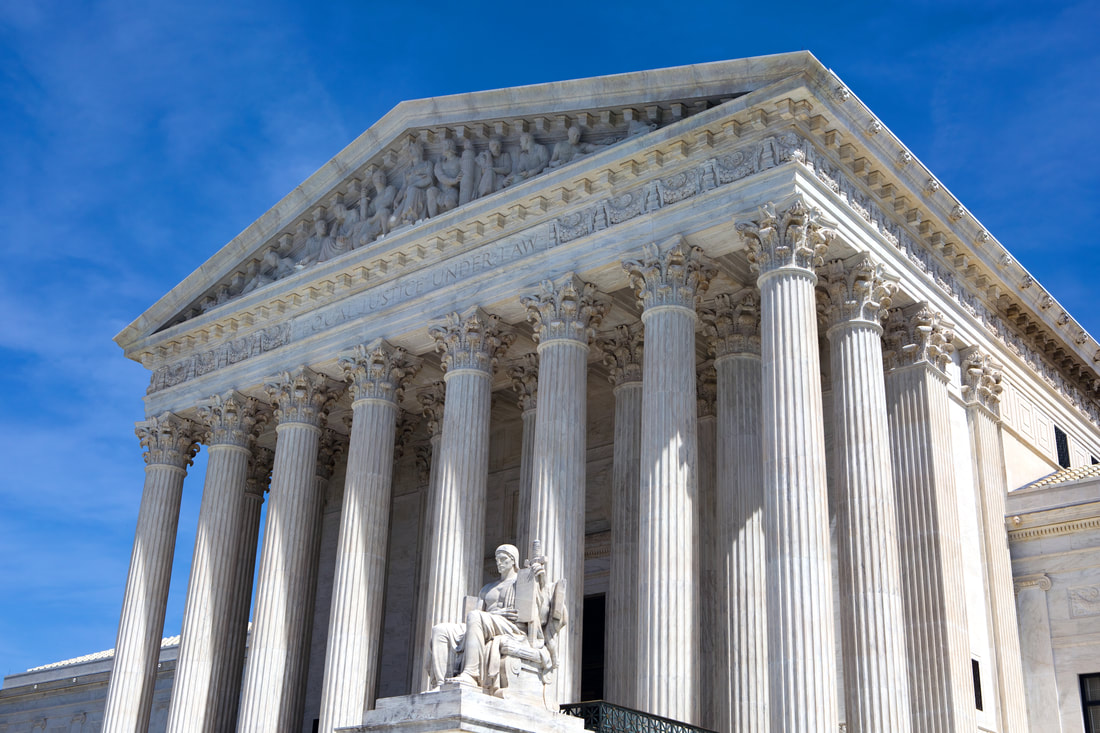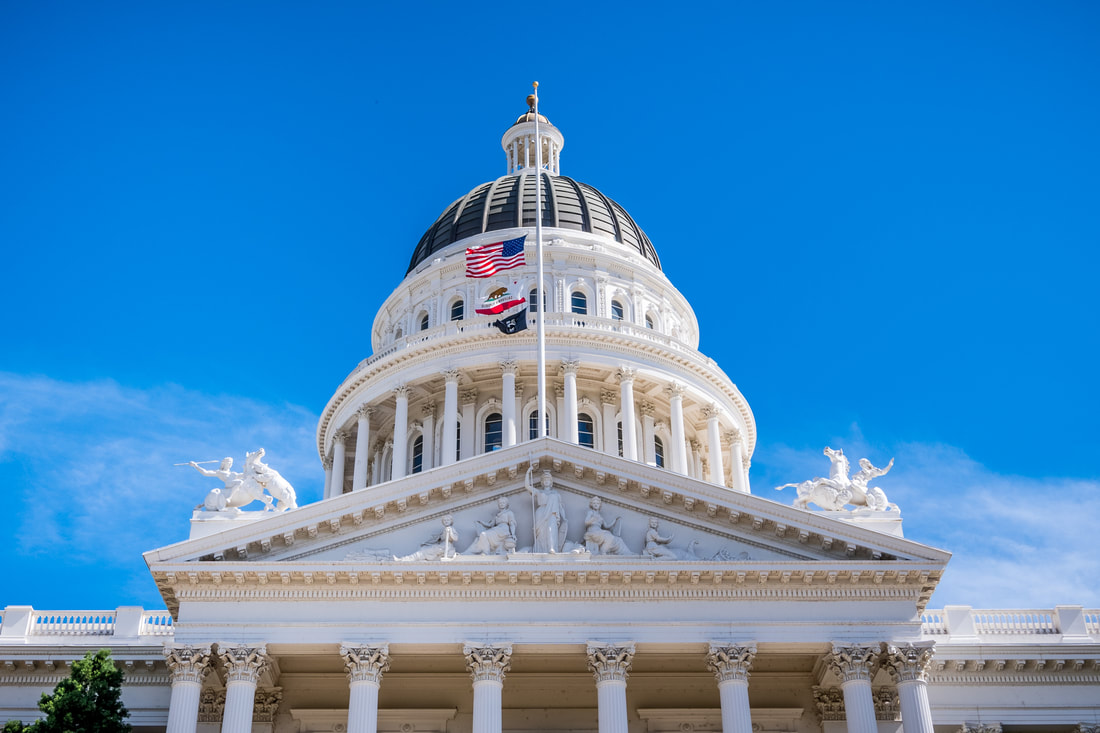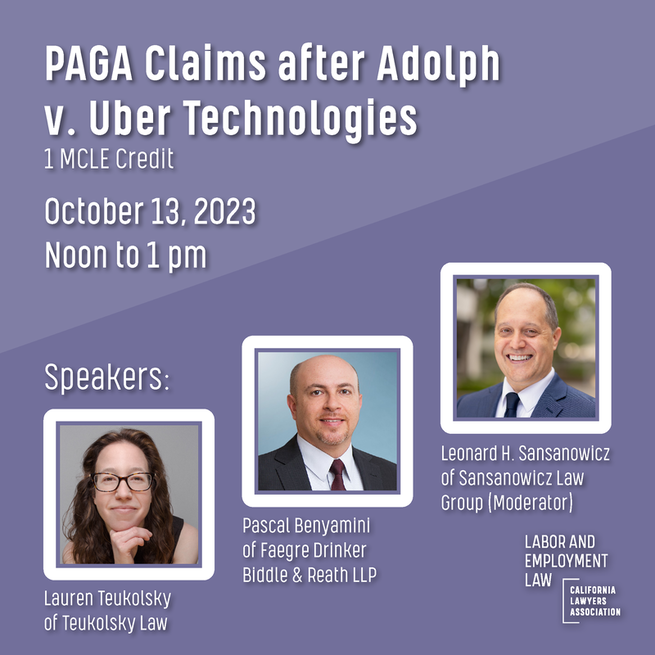|
Lauren Teukolsky was quoted in a Wednesday Bloomberg Law article about a recent Ninth Circuit opinion that discuss the effects of the California Supreme Court’s decision in Adolph v. Uber on PAGA cases proceeding in federal court. The Ninth Circuit ruled that federal courts are bound to follow the California Supreme Court’s interpretation of PAGA standing, and do not need to follow the U.S. Supreme Court’s mistaken interpretation of PAGA standing in its 2022 Viking River Cruises decision.
In the Circuit Court’s decision, Judge Kenneth Kiyul Lee stated in his concurring opinion that arbitration proceedings under PAGA may not constitute a “full and fair opportunity to litigate,” thus offering a potential exception to arbitration proceedings’ preclusive effect on their associated court proceedings. In other words, if an employer were to receive a worker-friendly ruling from an arbitrator, that ruling may not have bearing on the analogous issues the employer is litigating in court. How much of an effect Judge Lee’s opinion will have on California’s employment law landscape is still unclear. In Bloomberg Law’s article, Ms. Teukolsky says that the state’s appeals courts are still divided on the issue and have yet to “’squarely’” consider whether individual PAGA arbitration findings will impact group PAGA claims. “’It’s too soon,’” Ms. Teukolsky says in the article. The article also includes Ms. Teukolsky’s commentary on how Judge Lee’s opinion might be interpreted for the benefit of workers: “The logic in Lee’s concurring opinion could also help claimants wield the ‘full and fair opportunity to litigate’ argument against adverse arbitration findings when their group PAGA claims unfold in court, Teukolsky said.” Ms. Teukolsky has represented workers for over two decades and her commentary on the latest developments in employment law is regularly featured by major publications such as Bloomberg Law, Law360, Law.com, and the Los Angeles Times. To access the Bloomberg Law article in its entirety, click here. To learn more about Ms. Teukolsky’s practice and get in touch with the firm, click here.
0 Comments
On Tuesday, October 10th, Lauren Teukolsky will appear on an MCLE webinar hosted by the California Lawyers Association (CLA). The program is titled, “PAGA Claims after Adolph v. Uber Technologies,” and will unpack how the California Supreme Court’s summer ruling in Adolph will affect claims under California’s Private Attorneys General Act (PAGA). Ms. Teukolsky will speak alongside Pascal Benyamini, a Labor and Employment partner at Faegre Drinker Biddle & Reath LLP. Leonard H. Sansanowicz, founder of Sansanowicz Law Group, will moderate the discussion.
Ms. Teukolsky is a frequent speaker on employment law topics. In September Ms. Teukolsky was selected to moderate a session at CELA’s (California Employment Lawyer Association) 36th Annual Employment Law Conference. In the months prior to the conference, she discussed PAGA claims in a pair of webinars for the Alameda County Bar Association and Beverly Hills Bar Association. Her commentary on the effects of Adolph on PAGA claims was also recently featured in articles by Bloomberg Law and Law.com. CLA is a nonprofit, voluntary bar association serving thousands of licensed attorneys throughout California. Its Labor and Employment Law Section serves as a networking and educational forum for California’s labor and employment lawyers and non-lawyers with an interest in the field. The Tuesday program will begin at 12 pm PT. For information on how to attend the program, click here. To learn more about Ms. Teukolsky’s work, click here.  Lauren Teukolsky will speak on a panel for the Alameda County Bar Association’s (ACBA) Labor and Employment Symposium on Friday, September 15th. The panel is titled, “In Viking River’s Wake: Two Supreme Courts on the Future of PAGA,” and will focus on the viability of PAGA actions following the US Supreme Court’s opinion in Viking River and the California Supreme Court’s decision in Adolph v. Uber Technologies. Ms. Teukolsky will appear on the panel alongside Arthur Gaus, a partner at Kaufman Dolowich. The pairing will allow viewers to hear analysis from an employee’s perspective, represented by Ms. Teukolsky, and an employer’s perspective, represented by Mr. Gaus. Ms. Teukolsky’s commentary on both Viking River and Adolph v. Uber has been featured in a variety of publications, including Bloomberg Law, Daily Journal and Law.com. She also previously discussed the cases on panels presented by the Beverly Hills Bar Association, Los Angeles County Bar Association, and California Employment Lawyer Association. The panel will take place over Zoom in addition to several other panels being presented at the ACBA symposium. For more information on the panels and how to view them, click here. For more information on Ms. Teukolsky’s work and her firm, click here.  Lauren Teukolsky was quoted by Bloomberg Law and Law.com in a pair of articles this week on the CA Supreme Court’s Monday decision in Adolph v. Uber Technologies, Inc.. In the highly anticipated ruling, the Court held that the state’s workers could continue to pursue representative PAGA labor claims even if their individual labor claims were forced into arbitration. The Court’s ruling is considered a huge win for California’s workers. PAGA (Private Attorneys General Act) is a state law that authorizes employees to collect civil penalties for violations against themselves and their coworkers on behalf of California’s Labor Commissioner, which has struggled to manage a backlog of cases for the past several decades. Arbitration is a private dispute resolution process that overwhelmingly favors employers and shields corporations from public scrutiny and accountability. Employers frequently require their employees to sign agreements stipulating that all claims made by them will be resolved in private arbitration as opposed to being litigated through the courts, a process that is public and more favorable to workers. A ruling in Uber’s favor would have made it very difficult to bring PAGA cases forward – due to the prevalence of arbitration agreements – and would have seriously eroded workers’ ability to enforce the state’s labor laws. Uber’s lawyers have indicated that the company is considering appealing the Court’s decision. According to analysis Ms. Teukolsky published on LinkedIn, the U.S. Supreme Court is unlikely to hear such an appeal, especially in light of its 2022 decision in Viking River Cruises, Inc. v. Moriana. She said, “It's unlikely SCOTUS will hear a case from a state supreme court involving entirely state-law issues; there must a federal question involved.” Ms. Teukolsky has represented workers for over two decades and her commentary on the latest developments in employment law is regularly featured by major publications such as Bloomberg Law, Law360, Law.com, and the Los Angeles Times. To access the Bloomberg Law article in its entirety, click here. To access the Law.com article in its entirety, click here.  Last week, Bloomberg Law cited research by Lauren Teukolsky in an article about oral arguments in Moriana v. Viking River Cruises, Inc., a pivotal Supreme Court case that was sent back to the California Court of Appeal for further action. The appellate court’s decision could have vast repercussions for lawsuits brought under the Private Attorneys General Act (“PAGA”). Since SCOTUS’s Viking River decision, Ms. Teukolsky’s research shows that California courts have consistently rejected employer arguments that representative PAGA claims must be dismissed once the “individual” component of the plaintiff’s PAGA claim has been sent to arbitration. Bloomberg Law’s article states: “California trial courts dismissed representative claims after moving individual claims into arbitration in just six of 75 decisions collected and analyzed by Lauren Teukolsky of the plaintiff-side firm Teukolsky Law APC. Bloomberg Law independently reviewed those decisions.” Ms. Teukolsky’s updated numbers show an even greater trend in favor of employees. Viking River and the fate of PAGA have been on the forefront of labor and employment experts’ minds for the past several years. In addition to her commentary on the issue for news outlets such as Bloomberg Law and the Daily Journal, Ms. Teukolsky has also discussed the implications of Viking River on a panel for CELA, a statewide organization that works to protect and expand the legal rights of workers, as well as for the College of Labor and Employment Lawyers, the preeminent peer-selected organization of labor and employment lawyers in the United States. To read the article on Bloomberg Law, click here. To get in touch with Teukolsky Law, click here.  Lauren Teukolsky’s commentary was featured this week in a Bloomberg Law article on a pending case before the California Supreme Court, Adoph v. Uber Techs, Inc. The case is being closely monitored by both employee-side and management-side attorneys because of its potential ramifications for PAGA (Private Attorneys General Act) litigation. In the case, California’s highest court will decide whether aggrieved employees maintain standing to bring “non-individual” PAGA claims against their employers on behalf of similarly aggrieved employees when their individual claims are sent to arbitration, a private, quasi-court forum that is favored by employers. If the Court rules that such employees maintain their standing, it will clear the way for many employees to continue enforcing the state’s labor laws through PAGA, a 2004 state law that authorizes employees to collect civil penalties for violations against themselves and their coworkers on behalf of California’s Labor Commissioner, which has struggled to manage a backlog of cases for the past several decades. If the Court rules in Uber’s favor, the outlook for the state’s employees would not be so favorable. The Bloomberg Law article states: “A ruling in favor of Uber allowing claims to be split into individual and non-individual components could make it more difficult to bring PAGA cases forward, said Lauren Teukolsky, a plaintiff’s lawyer and founder of Teukolsky Law in Pasadena, Calif. ‘It’s going to make PAGA litigation much more cumbersome,’ she said. Teukolsky expects the court to rule this summer or in early fall.” Ms. Teukolsky also discussed why forcing employees to arbitrate claims is detrimental to them: “Teukolsky said that arbitration comes at a cost for employees because they waive their civil rights, such as the right to a jury trial and the right to an appeal, when they are asked to sign an arbitration agreement,” the article states. The case follows the U.S. Supreme Court’s 2022 decision in Viking River Cruises, Inc. v. Moriana in which a concurring opinion by Justice Sonia Sotomayor said that California courts should have the final say in whether employers can force arbitration for representative claims. To read the article in its entirety, click here.  Last month, Bloomberg Law quoted Lauren Teukolsky in an article about the differing approaches taken by California Superior Courts and federal courts towards representative Private Attorneys General Act (PAGA) claims in the months since the U.S. Supreme Court ruled in Viking River Cruises, Inc. v. Moriana. In Viking River, the majority held that employers could force arbitration of workers’ individual claims under PAGA, a California law that allows workers to sue companies for employment law violations on behalf of the state. However, the decision was written in a way that essentially left the fate of representative PAGA claims in the hands of California’s lower courts. For the most part, federal courts have strictly adhered to the Supreme Court’s ruling, sending individual claims to arbitration, and dismissing representative PAGA claims in over half of the decisions analyzed by Bloomberg Law. According to research conducted by Ms. Teukolsky, California’s state courts have taken a different tack. The article states: “In sharp contrast, state trial courts dismissed representative claims after moving individual claims into arbitration in just six of 75 decisions collected and analyzed by Lauren Teukolsky of the plaintiff-side firm Teukolsky Law PC. Bloomberg Law independently reviewed those decisions […] The trend of state courts not dismissing non-individual PAGA claims is a huge victory for workers in the state of California,” Teukolsky said. The fate of PAGA will likely be decided in Adolph v. Uber, which is currently pending before the California Supreme Court. Ms. Teukolsky is frequently cited in news publications for her commentary on developments in employment law, including a pair of Bloomberg Law and Daily Journal articles in 2022 that featured her commentary on Viking River. Ms. Teukolsky also discussed the case on several panels organized by the Los Angeles County Bar Association, the California Employment Lawyers Association, and the College of Labor and Employment Lawyers, the preeminent peer-selected organization of labor and employment lawyers in the United States. To learn more about Ms. Teukolsky’s experience, click here. To read the article in its entirety, click here. If you believe you’ve been treated unlawfully in the workplace and want to get in touch with our office, click here.  In December, Lauren Teukolsky was quoted in a Daily Journal article discussing the future of California’s Private Attorneys General Act (PAGA) in 2023. PAGA is a California labor law that allows workers to sue their employers for labor violations on behalf of the state. In 2022, the U.S. Supreme Court’s ruling in Viking River Cruises v. Moriana was believed by some to be a victory for employers, preventing employees from asserting PAGA claims affecting multiple employees. However, according to the article, research conducted by Ms. Teukolsky in the aftermath of Viking shows employees have fared well in California state courts: “Superior court judges have rejected defense motions to dismiss PAGA claims for a plaintiff’s co-workers 92% of the time even as they have referred individual claims to arbitration, according to records compiled by Lauren K. Teukolsky of the plaintiff’s firm Teukolsky Law APC. Just six PAGA cases have been dismissed in state court in what she referred to as the ‘full Alito.’” In federal courts, the picture painted by Ms. Teukolsky’s research is not as encouraging for workers. The article states: “Employers have had a lot more success in federal court, where judges have dismissed PAGA claims six of 11 times, she added. But the vast majority of cases – 75, Teukolsky said – have been considered in state court.” Ms. Teukolsky previously discussed the implications of Viking River on panels organized by the Los Angeles County Bar Association, the California Employment Lawyers Association, and the College of Labor and Employment Lawyers, the preeminent peer-selected organization of labor and employment lawyers in the United States. She is also frequently cited in news publications for her commentary on developments in employment law, including a June 2022 Bloomberg Law article that featured her commentary on Viking River. To learn more about Ms. Teukolsky’s experience, click here. To read the article in its entirety, click here. If you believe you’ve been treated unlawfully in the workplace and want to get in touch with our office, click here. Lauren Teukolsky to Speak at Los Angeles County Bar Association Program on Saturday, December 312/1/2022  Lauren Teukolsky will sit on a panel on Saturday, December 3rd to discuss Viking River Cruises, Inc. v. Moriana, a Supreme Court case that has changed the landscape of employment law. The program was organized by the Los Angeles County Bar Association (LACBA). Ms. Teukolsky will be joined by a trio of widely respected arbitrators and mediators, the Honorable Amy D. Hogue, Monique Ngo-Bonnici, and Deborah Crandall Saxe, along with George S. Howard Jr., a partner at Paul, Plevin, Sullivan & Connaughton LLP. The panelists will discuss the impact of Viking River on Private Attorneys General Act (“PAGA”) claims, and share tips on litigating PAGA cases in arbitration. Ms. Teukolsky has analyzed almost 80 post-Viking trial court orders, and will share her insights on how courts have been ruling on motions to compel arbitration since June 2022, when the U.S. Supreme Court decided Viking. She will also discuss several Court of Appeals decisions that have been handed down since Viking, and her predictions for how the California Supreme Court will rule in the highly anticipated Adoph v. Uber appeal, which will likely answer the question of PAGA standing addressed by the U.S. Supreme Court in Part IV of Viking. Ms. Teukolsky previously discussed the implications of Viking River on a panel for CELA, a statewide organization that works to protect and expand the legal rights of workers, as well as for the College of Labor and Employment Lawyers, the preeminent peer-selected organization of labor and employment lawyers in the United States. She is also frequently cited in news publications for her commentary on developments in employment law, including a June Bloomberg Law article that features her commentary on Viking River. To learn more about Ms. Teukolsky’s experience, click here. To register for the program, click here. Lauren Teukolsky published in November 2022 issue of California Labor & Employment Law Review11/2/2022  An article by Lauren Teukolsky was published in the November 2022 issue of the California Labor & Employment Law Review. In the article, Ms. Teukolsky discusses the history of Viking River Cruises, Inc. v. Moriana, a recently-decided U.S. Supreme Court case that has been closely monitored by worker’s advocates and corporate counsel alike. The article was co-authored with Michael Rubin, a renowned employment law attorney who represented Ms. Moriana before the U.S. Supreme Court. The article discusses the legal strategies used at the Supreme Court, what was (and wasn’t) decided in Viking, and why California trial courts have almost uniformly refused to be bound by the majority’s state-law-based holding in Part IV of the decision. Ms. Teukolsky has fought to protect employee’s rights for over 20 years and is an expert in employment law. She recently discussed Viking in a pair of panels hosted by the College of Labor and Employment Lawyers and the California Employment Lawyers Association. Her commentary on the Supreme Court case was also featured in an article by Bloomberg Law. The California Labor & Employment Law Review is an official publication of the California Lawyers Association (CLA) Labor and Employment Law Section. CLA is a nonprofit, voluntary bar association serving thousands of licensed attorneys throughout California. To read the article in its entirety, click here. To get in touch with our office, click here. |
AuthorLauren Teukolsky is the founder and owner of Teukolsky Law, A Professional Corporation. Archives
June 2024
Categories
All
|
Teukolsky Law, A Professional Corporation, represents clients throughout California. Ms. Teukolsky is admitted to practice in the State of California, as well as the United States Supreme Court, Ninth Circuit Court of Appeals, Northern District of California and Central District of California. Disclaimer.
Copyright © 2017
Copyright © 2017



 RSS Feed
RSS Feed